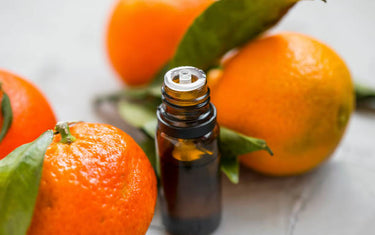6 min read / 3 February 2022 / Laura Garvin Gomez
Benefits and Uses of Tarragon Oil
Tarragon is associated with the goddess Artemis for its protective qualities.
Share this post

Known as "little dragon", the benefits of tarragon oil are fiercely effective, to say the least.
While it may not be the most infamous essential oil, its traditional uses for women have granted it an increasing amount of respectability in the world of aromatherapy.
These days the oil’s uses are far more unisex, and it has mainly been adopted as an appetite stimulant across holistic circles. It is also known as an effective anti-inflammatory, able to relieve pain and discomfort, and as a natural remedy for anxiety.
If you're interested in what tarragon essential oil has to offer you, we'll be explaining all the benefits, uses, and rich histories right here.
What is Tarragon Essential Oil?
Tarragon essential oil, or Artemisia dracunlus, has two namesakes. The second, ‘little dragon’, is said to be derived from the French for the herb, but the first is more easily explained.
Traditionally used to regulate periods and assist in labour, tarragon was considered a women’s herb, and so was named after the ‘protector of women’ – the goddess Artemis.
Extracted via steam distillation from the flowers and leaves of the tarragon herb, tarragon oil is usually pale yellow in colour and is believed to be native to Siberia.
What are the health benefits of Tarragon Essential Oil?
Strong and spicy with a mild earthiness and distinctive notes of anise, tarragon oil is widely credited as an uplifting oil.
Alongside its ancient associations, some of the benefits of tarragon essential oil include:
- Improving symptoms of arthritis
- Stimulating appetite
- Boosting mood and relieving stress
- Aiding with sleep
- Acting as an effective antibacterial
- Acting as a natural deodorant alternative
- Helping with menstrual symptoms

Can tarragon essential oil improve symptoms of arthritis?
Inflammatory conditions such as arthritis can be caused by a number of factors. One contributing factor can be a build-up of toxins, such as uric acid.
Tarragon essential oil has circulation-boosting abilities that can make it a useful remedy here – by boosting circulation, it can prevent toxin build-up by encouraging a regular flow of blood throughout the body.
Tarragon is also a natural anti-inflammatory. A study in 2016 found that tarragon oil showed significant anti-inflammatory activity and was able to effectively relieve accompanying pain.
Arthritis symptoms are mostly due to swelling around joints, but massaging a little diluted tarragon oil into the affected area may help to relieve this swelling and reduce discomfort.
Does tarragon oil stimulate appetite?
Tarragon oil has been used in European medicine to aid digestion and stimulate appetite for centuries.
It is thought to encourage the production of saliva and digestive juices, which helps it to speed up digestion and empty the stomach faster. This emptiness induces a feeling of hunger which allows us to better enjoy our food and absorb more nutrients.
Tarragon oil is also thought to decrease the hormone leptin. Leptin is responsible for causing a feeling of fullness in the stomach, like that which we experience after a large meal. Decreasing leptin can therefore provoke a feeling of hunger.
While internal consumption of essential oils is never recommended without the advice of a doctor, tarragon oil can be diffused in the air prior to mealtimes to help achieve a stimulating effect. Learn more about the dangers of ingesting essential oils.
Can tarragon essential oil boost mood and relieve stress?
Tarragon oil is not only beneficial for our physical health, but for our mental health too.
Used in the Ayurvedic system of medicine to treat hyperactivity, tarragon is both calming and uplifting - able to soothe restless minds whilst also offering a positive effect on our emotions.
A study in 2018 suggested that tarragon oil may be even more effective than some antidepressants in relieving anxiety and symptoms of stress, though medical professionals should still be consulted in the event of serious mental health struggles.
Is tarragon oil good for sleep?
Ayurvedic medicine also coins tarragon oil as an effective remedy against insomnia.
One 2015 study noticed a sedative effect in the Artemisia group of plants (which includes tarragon), meaning that the use of the oil before bed could help regulate sleep patterns and reduce symptoms surrounding fatigue.
Is tarragon essential oil antimicrobial?
Tarragon oil has both antibacterial and antifungal properties, which make it a wonderful natural cleanser for the skin. Its anti-inflammatory properties can also help to reduce redness and create a more even skin tone.
Alongside this, many studies have observed the power of these antibacterial effects on common strains found in the kitchen and on food. A 2012 study noted the effects of tarragon oil on Staphylococcus aureus and E. coli - two bacteria that are known for causing foodborne illnesses.
These hygienic properties, therefore, make tarragon oil an extremely effective home cleaner. You may want to try combining a few drops of tarragon essential oil with a spray bottle of water to create your own natural cleaning spray.
Can tarragon oil be used as a natural deodorant?
The antibacterial and antifungal properties of tarragon essential oil don't only benefit your home and your skin - they can also be used to tackle body odour.
Just as in your kitchen, the components of tarragon oil can help eliminate the bacteria on the skin which causes unpleasant aromas.
The spicy notes of tarragon oil also offer an all-natural, cleansing scent that can be ideal for those that aren't keen on commercial deodorants.
Does tarragon essential oil help with menstrual symptoms?
Using tarragon oil to help dispel menstrual symptoms is one of its most traditional uses, and is still an impactful benefit today.
Tarragon's major components are known for effectively balancing feminine hormones, which can lead to a reduction in mood swings as well as regulation of the monthly menstrual cycle.
Tarragon oil's anti-inflammatory properties can also offer up some relief against cramping when applied topically to the abdominal area.
How to use Tarragon Essential Oil
Thanks to its versatility, tarragon essential oil can be used in a number of ways across our routines. We've listed some of its most popular uses below.
Aromatherapy
The distinctive aromas of tarragon oil provide more than just a spicy backdrop for our living spaces.
Diffusing some tarragon oil throughout your home can help achieve positive and uplifting emotions, as well as the reduction of stress and anxiety in your day-to-day.
The use of tarragon oil can also stimulate appetite if you're struggling to feel hungry before mealtimes. Try adding 5-8 drops of the oil to your electric diffuser or oil burner and enjoy the effects of this ancient remedy.
Massage
If you're struggling with muscular or joint pain, the anti-inflammatory effects of tarragon essential oil can help increase blood flow and minimise symptoms.
To feel these effects, try combining a few drops of tarragon essential oil with a carrier oil and performing a gentle massage on the painful locations. You can also massage your abdominal area in this way if you're struggling with menstrual cramping.
Skincare
Highly antibacterial and antifungal, tarragon essential oil is ideal for creating an all-natural facial cleanser.
Try diluting it with a carrier oil and applying it as a part of your skincare routine, or sprinkling a few drops into your existing products for additional protection.
You can also make your own deodorant using tarragon oil and your favourite carrier oil.
Cleaning
Minimise the need for chemical home cleaners by creating your own multi-purpose surface spray using tarragon oil.
Simply add a few drops to a glass spray bottle filled with water, shake well, and spray as needed.
History of Tarragon Essential Oil
While there isn't much recorded history on tarragon before the thirteenth century, there are still believed to be many ancient uses for the herb.
In the Middle Ages, for instance, tarragon was used during the plague to help disinfect and purify affected sufferers. The ancient Greeks are also said to have used tarragon to treat toothaches, while the Chinese would employ it as an effective antispasmodic.
Prehistoric Iranian healers and Europeans alike developed more modern uses for the herb, adopting it as an appetite stimulator.

Offering relief from a number of physical and mental complaints, tarragon oil is something of a sedative saviour.
There is another side to this herbal oil, however, that boasts uplifting, stimulating properties, able not only to relieve our discomfort but contribute to our joy.










